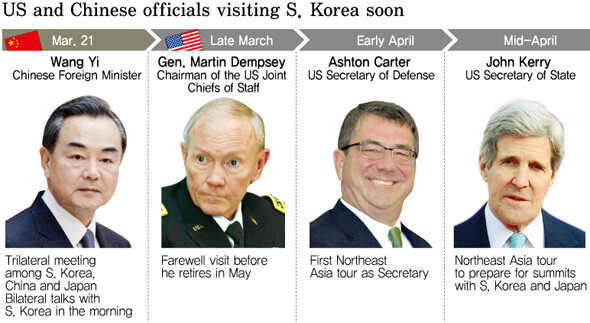hankyoreh
Links to other country sites 다른 나라 사이트 링크
Big showdown over THAAD coming up in Seoul

With the dust yet to settle from the vice ministerial dispute in Seoul between South Korea and China, consecutive visits by top officials from China and the US could mean an ever bigger clash ahead. South Korea’s diplomacy is once again being put to a serious test as it navigates between two major powers clashing over the deployment of the Terminal High Altitude Area Defense (THAAD) anti-ballistic missile system in the Korean Peninsula.
This time, it is China that has been on the offensive. An upcoming trilateral meeting of the South Korean, Chinese, and Japanese foreign ministers in Seoul on Mar. 21 is expected to become ground zero for a diplomatic clash. The key focus could be what Chinese foreign minister Wang Yi will say about THAAD during separate bilateral talks with South Korea in the morning before the afternoon’s trilateral meeting.
Recent remarks on the issue by China‘s Assistant Minister of Foreign Affairs Liu Jianchao could mean that Wang will also weigh in. Speaking at the bilateral vice ministerial meeting on Mar. 16, Liu expressed blunt opposition to the THAAD deployment, saying he “hopes China’s interests and concerns will be taken seriously.”
It is unclear for now if Wang will be as direct and aggressive as Liu in expressing an opinion, or the tenor of his remarks. Trilateral meetings in the past have typically pitted South Korea and China against Japan, with the former two sharing the experience of occupation during the Japanese empire. For this reason, Beijing may wish to avoid giving the appearance of openly disagreeing with Seoul. Seoul’s sharp outcry to Liu’s frank remarks - with the Ministry of National Defense calling on China not to “interfere with South Korea’s sovereignty” - could provide another deterrent.
But if Wang does decide to risk a backlash with aggressive rhetoric, South Korea would end up facing an entirely new diplomatic ball game than it did with Liu. It would mean the top diplomatic official in China explicitly stating that Beijing views the THAAD issue as more central to its interests than relations with Seoul.
In related news, a number of top US officials are expected to visit Seoul. Chairman of the Joint Chiefs of Staff Gen. Martin Dempsey is scheduled to visit in late March, while other Seoul visits are expected in April from Secretary of Defense Ashton Carter and Secretary of State John Kerry. While THAAD is not the chief reason for the visits, all three men are top officials dealing directly or indirectly with the issue. And with the deployment escalating from a South Korea-US issue to a major security concern with China as well, discussions of it will be difficult to avoid.
For now, the main focus is on Carter. A South Korean government official explained that Carter was “preparing for a South Korea visit sometime around early April for new appointments.”
Carter has been called a “North Korea hawk” who advocated preemptive strikes on nuclear facilities and Taepodong-2 missile bases during the first North Korean nuclear crisis in 1993-94. At his early February confirmation hearing, he declared plans for large-scale reinforcement of the US missile defense system to defend the American mainland against the threat of North Korean intercontinental ballistic missiles. South Korea may find itself with less and less room to maneuver diplomatically if Carter or the other top US officials come out once again openly disputing China’s objections to the THAAD deployment.
By Son Won-je, staff reporter and Park Byong-su, senior staff writer
Please direct questions or comments to [english@hani.co.kr]

Editorial・opinion
![[Column] Season 2 of special prosecutor probe may be coming to Korea soon [Column] Season 2 of special prosecutor probe may be coming to Korea soon](https://flexible.img.hani.co.kr/flexible/normal/500/300/imgdb/original/2024/0426/3317141030699447.jpg) [Column] Season 2 of special prosecutor probe may be coming to Korea soon
[Column] Season 2 of special prosecutor probe may be coming to Korea soon![[Column] Park Geun-hye déjà vu in Yoon Suk-yeol [Column] Park Geun-hye déjà vu in Yoon Suk-yeol](https://flexible.img.hani.co.kr/flexible/normal/500/300/imgdb/original/2024/0424/651713945113788.jpg) [Column] Park Geun-hye déjà vu in Yoon Suk-yeol
[Column] Park Geun-hye déjà vu in Yoon Suk-yeol- [Editorial] New weight of N. Korea’s nuclear threats makes dialogue all the more urgent
- [Guest essay] The real reason Korea’s new right wants to dub Rhee a founding father
- [Column] ‘Choson’: Is it time we start referring to N. Korea in its own terms?
- [Editorial] Japan’s rewriting of history with Korea has gone too far
- [Column] The president’s questionable capacity for dialogue
- [Column] Are chaebol firms just pizza pies for families to divvy up as they please?
- [Column] Has Korea, too, crossed the Rubicon on China?
- [Correspondent’s column] In Japan’s alliance with US, echoes of its past alliances with UK
Most viewed articles
- 1‘We must say no’: Seoul defense chief on Korean, USFK involvement in hypothetical Taiwan crisis
- 2[Column] Season 2 of special prosecutor probe may be coming to Korea soon
- 3N. Korean delegation’s trip to Iran shows how Pyongyang is leveraging ties with Moscow
- 4Amnesty notes ‘erosion’ of freedom of expression in Korea in annual human rights report
- 5Korea sees more deaths than births for 52nd consecutive month in February
- 6[Reportage] On US campuses, student risk arrest as they call for divestment from Israel
- 7[Editorial] New weight of N. Korea’s nuclear threats makes dialogue all the more urgent
- 8‘Weddingflation’ breaks the bank for Korean couples-to-be
- 9Division commander ordered troops to enter raging flood waters before Marine died, survivor says
- 10[Editorial] Korea’s surprise Q1 growth requires objective assessment, not blind fanfare